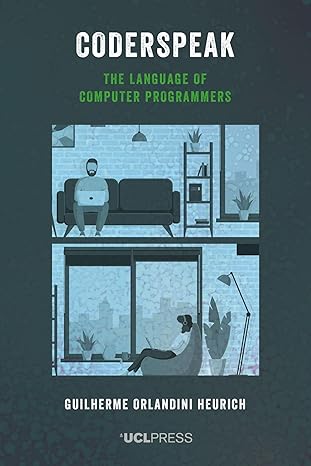
|
FreeComputerBooks.com
Links to Free Computer, Mathematics, Technical Books all over the World
|
|
- Title: Coderspeak: The Language of Computer Programmers
- Author(s) Guilherme Orlandini Heurich
- Publisher: UCL Press (November 5, 2024); eBook (Creative Commons Licensed)
- License(s): Creative Commons License (CC)
- Hardcover: 184 pages
- eBook: PDF (214 pages)
- Language: English
- ISBN-10: 1800085990
- ISBN-13: 978-1800085992
- Share This:

|
This book delves into the hidden world of software development, offering a combined anthropological and technical approach that explores the coder community's impact on our digital landscape.
About the Authors- Guilherme Orlandini Heurich is an honorary research fellow in the Department of Anthropology at UCL, UK.
- Computer Programming
- Miscellaneous Computer Languages
- Software Engineering Principles and Practices
- Computer Science

- Coderspeak: The Language of Computer Programmers (Guilherme Orlandini Heurich)
- The Mirror Site (1) - PDF
-
 The Super Programmer: A Colorful Introduction to Engineering!
The Super Programmer: A Colorful Introduction to Engineering!
For the programmers who don't want to limit their knowledge and skills on a very narrow area of software engineering. A book discussing some of the most underrated topics in computer-science by implementing them from scratch!
-
 A Practical Theory of Programming (Eric C.R. Hehner)
A Practical Theory of Programming (Eric C.R. Hehner)
This book explores aspects of programming that are amenable to mathematical proof. The author describes a programming theory which is much simpler and more comprehensive than the current theories to date.
-
 Elements of Programming (Alexander Stepanov, et al)
Elements of Programming (Alexander Stepanov, et al)
The book shows that algorithms implemented in a real programming language, such as C++, can operate in the most general mathematical setting. For example, the fast exponentiation algorithm is defined to work with any associative operation.
-
 Programming Fundamentals - A Modular Structured Approach
Programming Fundamentals - A Modular Structured Approach
This book is an introduction to computer programming using any of a variety of programming languages, including C++, C#, Java, JavaScript, Python, and Swift, for writing programmes, and to solid, fundamental programming principles.
-
 Structure and Interpretation of Computer Programs using JavaScript
Structure and Interpretation of Computer Programs using JavaScript
This book introduces the reader to central ideas of computation by establishing a series of mental models for computation. It has had a dramatic impact on computer science curricula over the past decades. Examples are implemented using the JavaScript.
-
 How to Design Programs: An Introduction to Programming
How to Design Programs: An Introduction to Programming
This introduction to programming places computer science at the core of a liberal arts education. Unlike other introductory books, it focuses on the program design process, presenting program design guidelines.
-
 Foundations of Machine Learning (Mehryar Mohri, et al)
Foundations of Machine Learning (Mehryar Mohri, et al)
This book is a general introduction to machine learning. It covers fundamental modern topics in machine learning while providing the theoretical basis and conceptual tools needed for the discussion and justification of algorithms.
-
 Software Design for Flexibility: Avoid Programming into a Corner
Software Design for Flexibility: Avoid Programming into a Corner
This book describes techniques they have found effective--over their combined 100-plus years of programming experience--that will help programmers avoid programming themselves into corners.
-
 Isomorphism - Mathematics of Programming (Xinyu Liu)
Isomorphism - Mathematics of Programming (Xinyu Liu)
This book introduces the mathematics behind computer programming. It intents to tell: programming is isomorphic to mathematics. Just like in art and music, there are interesting stories and mathematicians behind the great minds.
-
 Structure and Interpretation of Computer Programs, 2nd Edition
Structure and Interpretation of Computer Programs, 2nd Edition
This book has had a dramatic impact on computer science curricula over the past decade. This long-awaited revision contains changes throughout the text. Examples are implemented using the Scheme dialect of Lisp.
-
 Exploratory Programming for the Arts and Humanities
Exploratory Programming for the Arts and Humanities
This book introduces programming to readers involved with the arts and humanities; there are no prerequisites, and no previous knowledge of programming is assumed. It reveals programming can also be a tool for sketching, brainstorming, and inquiry.
-
 Programming Persistent Memory: A Comprehensive Guide
Programming Persistent Memory: A Comprehensive Guide
The book explains fundamental concepts, provides an introduction to Persistent Memory programming APIs for C, C++, JavaScript, and other languages, discusses RMDA with persistent memory; reviews security features; and presents many examples.
-
 Answer Set Programming (Vladimir Lifschitz)
Answer Set Programming (Vladimir Lifschitz)
This book book will introduce the reader to the theory and practice of Answer Set Programming (ASP). It will include numerous examples of ASP programs and present the mathematical theory that ASP is based on, and exercises with complete solutions.
-
 Aesthetic Programming: A Handbook of Software Studies
Aesthetic Programming: A Handbook of Software Studies
The book explores the technical as well as cultural imaginaries of programming from its insides, introduces and demonstrates the reflexive practice of aesthetic programming, engaging with learning to program as a way to understand and question.
-
 Competitive Programmer's Handbook (Antti Laaksonen)
Competitive Programmer's Handbook (Antti Laaksonen)
The purpose of this book is to give you a thorough introduction to competitive programming. It is assumed that you already know the basics of programming, but no previous background in competitive programming is needed.
-
 Principles of Algorithmic Problem Solving (Johan Sannemo)
Principles of Algorithmic Problem Solving (Johan Sannemo)
The algorithmic approach to solving problems in computer technology is an essential tool. This book presents a readable, entertaining, and energetic book that will motivate and challenge students to open their minds to the algorithmic nature of problem solving.
-
 The Black Art of Programming (Mark McIlroy)
The Black Art of Programming (Mark McIlroy)
This book is an introduction to computer programming. It covers the essential information of a Computer Science course. It is recommended for beginners and intermediate programmers.





